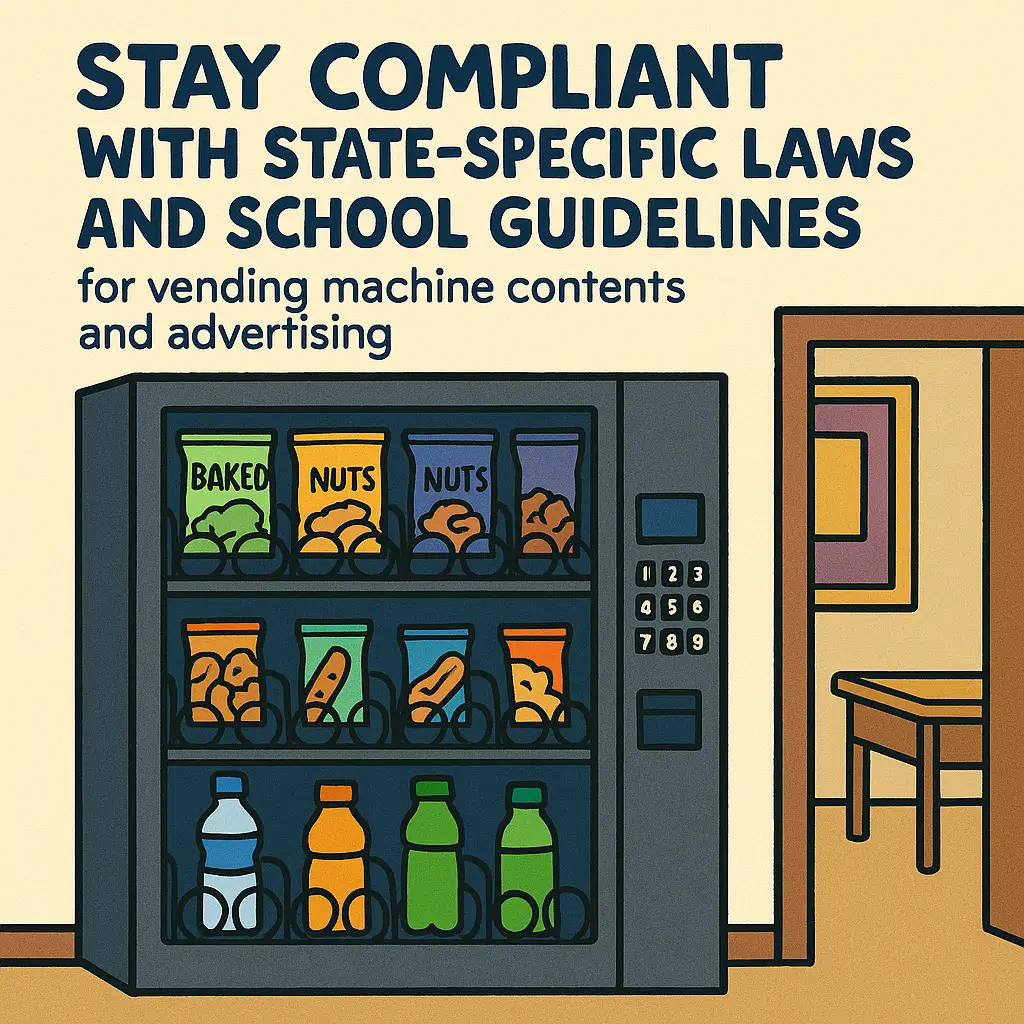State Regulations for Healthy Vending
Stay compliant with state-specific laws and school guidelines for vending machine contents and advertising.
Back to Healthy Vending Services ResourcesStay compliant with state-specific laws and school guidelines for vending machine contents and advertising.
Back to Healthy Vending Services ResourcesMost states follow USDA Smart Snacks standards for schools, but some add stricter rules on calories, portion sizes, advertising, and placement. Understanding your local rules ensures compliance, especially in K-12 and public facilities.
![]() Calorie limits vary widely across different state school regulations
Calorie limits vary widely across different state school regulations
![]() Many states require labeling for nutritional transparency
Many states require labeling for nutritional transparency
![]() Healthy vending helps schools meet wellness policy goals
Healthy vending helps schools meet wellness policy goals

State regulations for healthy vending are designed to promote better nutritional standards, especially in schools and public institutions. While the USDA Smart Snacks in School guidelines serve as a federal baseline, many states have implemented their own policies that expand or tighten these standards. Understanding these differences is critical if you're planning to install vending machines in schools, government buildings, or wellness-oriented facilities.
Healthy vending laws typically focus on limits for calories, sugar, sodium, and fat content per item. For example, some states restrict beverages to only water, milk, or 100% fruit juice in certain settings. Others may limit snacks to under 200 calories and prohibit items with trans fats or high sodium. Labeling is also a common requirement, with many state rules calling for clear calorie counts displayed at the point of purchase.
School environments are particularly regulated. Many states adhere to, or build upon, USDA Smart Snacks criteria—targeting snack content, portion sizes, and even restrictions on advertising certain food types on school property. That means even the graphics or branding visible on a vending machine must align with school wellness policy.
In non-school locations, such as state office buildings or public transit areas, compliance varies by jurisdiction. Some states mandate a specific percentage of offerings in vending machines be categorized as "healthier options"—often 50% or more. These rules may require products to meet certain nutrition thresholds or be classified according to tools like the NEMS-V or green/yellow/red guidance systems.
Staying up-to-date on your state and county regulations helps prevent fines or removal of machines. Healthy vending also supports wellness programs and promotes better choices in breakrooms, lobbies, and campus environments. If switching vendors, make sure your new provider understands and complies with local rules.
For insights on food selection that meets workplace needs, explore our guide to popular vending options for factories. You can also compare managed vs self-managed vending services to see how compliance is maintained under each model.
If you're exploring vending options for your business, Vending Exchange can help simplify the process. Delivery, Installation and Equipment is provided at no cost to you - vendors provide the machines, keep them stocked, and handle all servicing. Whether you need a provider or full-service management, just fill out the form on this page to get started.
Smart Snacks in School is a federal standard from the USDA that sets guidelines for calorie, fat, sugar, and sodium limits in foods sold during the school day.
Most states adopt these guidelines for school vending machines, but some extend them with stricter rules on nutrition, advertising, and product placement.
In most states and under federal Smart Snacks policies, sugary sodas are not allowed in schools during school hours. Some states allow diet options in high schools only.
Many state regulations require vending machines to display calorie information at point of purchase, with nutrition labels easily available upon request.
Changes typically occur with updates to school wellness policies, public health initiatives, or state procurement procedures. It's important to review regulations annually.
Non-compliance may result in removal of the machine, loss of vending rights, or fines depending on state rules and the type of facility involved.
Yes, many states restrict beverages in schools to items like water, milk, and 100% juice, while limiting sugar content and serving size.
You can use online calculators from the USDA or refer to vendor product lists already marked as Smart Snack-compliant.
Yes, school-focused regulations often prohibit promoting non-compliant food brands or unhealthy options on machines, posters, or school materials.
Commonly accepted items include low-calorie granola bars, trail mix, water, sparkling water, baked chips, and shelf-stable fruit packs.